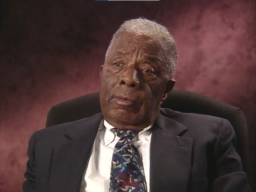You searched for: FACEBOOK代全世界推广开户【TG飞机:@bapingseo】谷歌seo网站推荐【TG电报:@bapingseo】尼日利亚做广告【Telegram:@bapingseo】128棋牌下载hi合乐888手机?20220707j5C1Wb.html
<< Previous | Displaying results 51-60 of 1613 for "FACEBOOK代全世界推广开户【TG飞机:@bapingseo】谷歌seo网站推荐【TG电报:@bapingseo】尼日利亚做广告【Telegram:@bapingseo】128棋牌下载hi合乐888手机?20220707j5C1Wb.html" | Next >>
-
Thomas with his mother, Gerda, before Thomas's departure for the United States
PhotoThomas Buergenthal with his mother, Gerda, before Thomas's departure for the United States. Bad Neuheim, Germany, summer 1951. With the end of World War II and collapse of the Nazi regime, survivors of the Holocaust faced the daunting task of rebuilding their lives. With little in the way of financial resources and few, if any, surviving family members, most eventually emigrated from Europe to start their lives again. Between 1945 and 1952, more than 80,000 Holocaust survivors immigrated to the United…
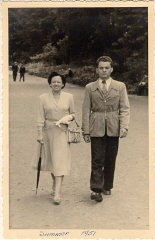
-
Ernest G. Heppner describes learning about the Holocaust and the fate of his relatives
Oral HistoryErnest's family owned a factory that made matzah, the unleavened bread eaten during Passover. In February 1939, three months after Kristallnacht (the "Night of Broken Glass" pogroms), Ernest and his mother fled to Shanghai, one of few havens for refugees without visas. His father and sister stayed behind in Germany; they perished during the Holocaust. A brother escaped to England. Ernest and his mother found work in Shanghai. In 1947, he came to the United States with his wife, whom he met and married in…
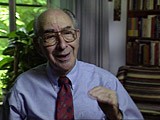
-
Norbert I. Swislocki describes fleeing from Warsaw with his mother
Oral HistoryNorbert was 3 years old when Germany invaded Poland in September 1939. He and his mother were in Warsaw; his father had been drafted into the Polish army and later ended up in Vilna. Norbert and his mother set out to join him and the family was reunited after a few months. After the family had been in Vilna for about a year, Norbert's father was able to obtain visas for Curacao in the Dutch West Indies and visas for transit through Japan. Norbert and his parents left Vilna in January 1941, and arrived in…
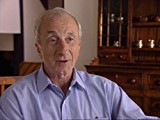
-
Leo Schneiderman describes arrival at Auschwitz, selection, and separation from his family
Oral HistoryThe Germans invaded Poland in September 1939. Leo and his family were confined to a ghetto in Lodz. Leo was forced to work as a tailor in a uniform factory. The Lodz ghetto was liquidated in 1944, and Leo was deported to Auschwitz. He was then sent to the Gross-Rosen camp system for forced labor. As the Soviet army advanced, the prisoners were transferred to the Ebensee camp in Austria. The Ebensee camp was liberated in 1945.
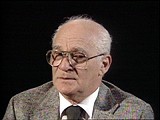
-
Photograph showing Kurt, Helene Reik's son, and his wife, on vacation in Croatia
PhotoPhotograph showing Kurt, Helene Reik's son, and his wife, while on vacation in April/May 1938 in Kupari, Croatia. After her deportation to the Theresienstadt ghetto in Czechoslovakia, Helene yearned to record what was happening to her. This photograph was sent to Helene, who used it as paper for her diary in Theresienstadt. Helene’s makeshift diary offers wistful memories of her husband and parents who died before the war, loving thoughts of her family who had left Europe in 1939, and a firsthand…
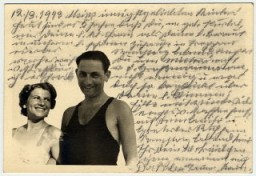
-
Photograph showing Kurt, Helene Reik's son, holding his baby Margarida
PhotoPhotograph showing Kurt, Helene Reik's son, holding his baby Margarida, in Rio de Janeiro in 1940. After her deportation to the Theresienstadt ghetto in Czechoslovakia, Helene yearned to record what was happening to her. This photograph was sent to Helene, who used it as paper for her diary in Theresienstadt. Helene’s makeshift diary offers wistful memories of her husband and parents who died before the war, loving thoughts of her family who had left Europe in 1939, and a firsthand account of the…
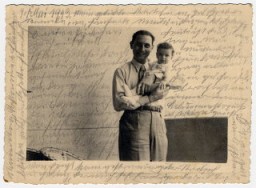
-
Leif Donde describes his family's escape from Denmark to Sweden
Oral HistoryThe Germans occupied Denmark in April 1940, but the Danish government remained in existence and was able to protect Danish Jews. In August 1943, the government resigned after refusing to accede to German demands. German police began to arrest Jews in early October. Leif and his family decided to flee, and were smuggled by fishing boat to safety in Sweden. In Sweden, Leif attended school and his parents worked in a garment factory. The family returned to Denmark after the end of the war.

-
Leon Bass describes his feelings about joining the US Army
Oral HistoryLeon Bass was born in Philadelphia, PA in 1925. He joined the US Army in 1943 and served as a member of the all-Black 183rd Engineer Combat Battalion attached to General Patton's Third Army. Leon's unit was involved in the Battle of the Bulge as well as the liberation of Buchenwald. After the war, Leon went on to receive his doctorate, teach, and speak about the Holocaust and racism. In this interview, Leon describes the racism and segregation he faced in the United States during the 1940s and how it…
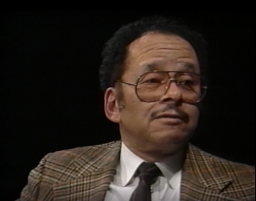
-
Norbert Wollheim describes his liberation at Schwerin, in northeast Germany, in May 1945
Oral HistoryNorbert studied law and was a social worker in Berlin. He worked on the Kindertransport (Children's Transport) program, arranging to send Jewish children from Europe to Great Britain. His parents, who also lived in Berlin, were deported in December 1942. Norbert, his wife, and their child were deported to Auschwitz in March 1943. He was separated from his wife and child, and sent to the Buna works near Auschwitz III (Monowitz) for forced labor. Norbert survived the Auschwitz camp, and was liberated by US…
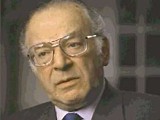
-
Olympic athlete John Woodruff describes his experiences of discrimination
Oral HistoryIn 1936, John Woodruff was one of 18 African Americans on the US Olympic team competing in Berlin. He won the gold medal for the men's 800-meter race. In this clip from an interview on May 15, 1996, Woodruff describes his personal experiences of racial discrimination during and after the Olympic Games of 1936.
